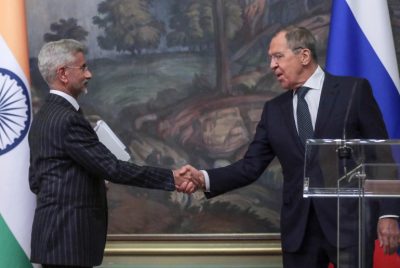India Takes Full Advantage of Cheap Russian Oil

All Global Research articles can be read in 51 languages by activating the Translate Website button below the author’s name.
To receive Global Research’s Daily Newsletter (selected articles), click here.
Follow us on Instagram and Twitter and subscribe to our Telegram Channel. Feel free to repost and share widely Global Research articles.
***
During his first visit to Moscow since the military operation in Ukraine began, Indian Foreign Minister Subrahmanyam Jaishankar told his Russian counterpart Sergey Lavrov that his country will continue buying cheap oil from Russia. The two foreign ministers also discussed initiatives to boost cooperation in agriculture, defence and infrastructure.
Jaishankar met with Lavrov on November 8 with senior officials in charge of agriculture, petroleum and natural gas, ports and shipping, finance, chemicals and fertiliser, and trade accompanying him, thus demonstrating the long and strong relationship between India and Russia.
“Russia has been a steady and time-tested partner. Any objective evaluation of our relationship over many decades would confirm that it has actually served both our countries very, very well,” Jaishankar said in a joint news conference.
“As the world’s third-largest consumer of oil and gas, a consumer where the levels of income are not very high, it is our fundamental obligation to ensure that the Indian consumer has the best possible access on the most advantageous terms to international markets,” the Indian foreign minister stressed. “We have seen that the India-Russia relationship has worked to advantage… I would like to keep that going.”
New Delhi, despite Western pressure, has not condemned Russia’s special military operation in Ukraine and is now Moscow’s largest oil customer after China. India traditionally purchases its oil from Iraq and Saudi Arabia, but Russian imports have surged due to its favourable prices offered to countries that have not imposed sanctions.
Russia became India’s main supplier of oil in October, exporting 946,000 barrels per day, according to energy analytics firm Vortexa. Before the war in Ukraine, Russian oil accounted for very little of India’s imports. However, with western-imposed sanctions on Russian oil and gas, Moscow has become an obvious partner for a New Delhi that is happy to take advantage of low-cost oil supplies. Russian oil prices have been highly competitive with Middle Eastern and African crude, leading India to deepen ties with Moscow even further.
Although New Delhi is massively benefitting from the current situation, US Treasury Secretary Janet Yellen told news outlet PTI ahead of her upcoming trip to India on November 11 that the country could benefit from a price cap on Russian oil.
“Our objective is to hold down the price that Russia receives for its oil and keep that oil trading. The gainers from this will be particularly those countries that do buy cheap Russian oil, and our hope would be that India would take advantage of this price cap, though its firms are bargaining with Russia,” Yellen told PTI.
“If they (India) want to use Western financial services like insurance, the price cap would apply to their purchases. But even if they use other financial services, we believe the price cap will give them leverage to negotiate good discounts from world markets,” she added.
She is expected to discuss with Indian officials a G7 plan to cap the price of Russian oil. US officials and G7 countries have been in intense negotiations in recent weeks over the imposition of a price cap on sea-borne oil shipments that are expected to begin on December 5. This is to ensure that sanctions do not throttle the global oil market.
During the meeting of the Indian and Russian foreign ministers, Lavrov hailed his “Indian friends” for their position on the Ukraine crisis and accused Western countries of trying to consolidate a “dominant role in world affairs” and prevent “the democratization of international relations.” Lavrov also said during his fifth meeting with Jaishankar this year, “We discussed in detail the state and prospects of military-technical cooperation, including joint production of modern arms.”
It is recalled that the two countries in 2021 agreed to a $677 million deal to produce AK-203 assault rifles in India. Russia for decades has assisted New Delhi in its push for self-reliance in defence manufacturing, especially as the South Asian country is one of the world’s largest buyers of defence equipment. India in the decade between 2011 and 2021 imported a massive $20 billion worth of Russian defence equipment.
According to Lavrov, Russia and India also want to cooperate more closely in the fields of nuclear energy and space travel. Russia is also the fourth-biggest market for Indian pharmaceutical products. Given all these points of mutual interest, it is little surprise that Lavrov and Jaishankar have met five times in a single year despite significant efforts by Washington, London and Brussels to isolate Moscow. It is also unlikely that Yellen will convince New Delhi to abandon its current energy policy.
*
Note to readers: Please click the share buttons above. Follow us on Instagram and Twitter and subscribe to our Telegram Channel. Feel free to repost and share widely Global Research articles.
Ahmed Adel is a Cairo-based geopolitics and political economy researcher.
Featured image is from InfoBrics

